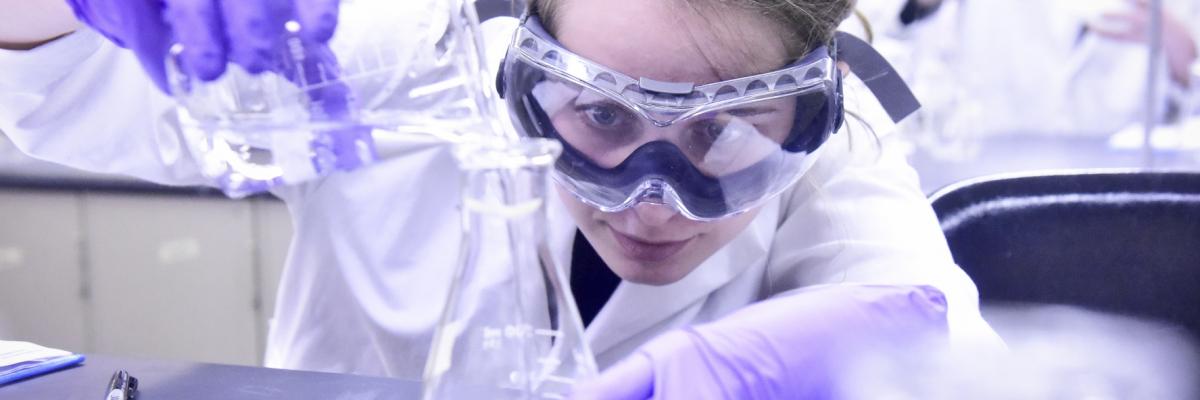Chemistry Major (HBSc)
Admissions Category: Physical & Environmental Sciences
Are you a prospective student applicant?
You can enter the Health Sciences Stream to accelerate your career in a health care profession

Program Overview
Chemistry is the science that examines the building blocks of all matter; it attempts to explain the similarities and differences between substances and materials, and explains and theorizes how some substances react with others. Chemistry at UTSC is both a challenging intellectual pursuit and a powerful and practical tool for managing resources. The program includes four sub-disciplines: Analytic Chemistry, Inorganic Chemistry, Organic Chemistry, and Physical Chemistry. Laboratory work is an integral component of the program. The labs are sized to offer a small student/demonstrator ratio (maximum 20), which allows for close interaction and positive teaching and learning experiences.
Complementary Programs:
Human Biology, Conservation and Biodiversity, Computer Science, Environmental Science, Neuroscience, Plant Biology, Health Studies
Check out future career opportunities and skills acquired from completing this program:
Competencies & Skills
- Engage in team-based research, analysis and problem solving
- Design and conduct laboratory research including data collection, analysis and interpretation
- Write technical reports and project proposals
- Present scientific research in an organized and succinct manner for a wide variety of audiences
Careers for Graduates
- Document Controller in Manufacturing
- Quality Control in Pharmaceuticals
- Chemist
- Policy Analyst in Government
- Clinical Research in Hospitals
- Clinical Sales in Medical Supplies
- Quality Assurance
- Scientific Writing
Further Education
- Chemistry
- Chemical engineering
- Education
- Medicine
- Pharmacy
Program Pathway
Year 1 | Year 2 | Year 3 | Year 4Choose Your Courses Wisely
Complete 3.0 credits as follows:
- CHMA10H3
- CHMA11H3 or CHMA12H3
- MATA30H3
- MATA36H3
- PHYA10H3
- PHYA21H3
- Explore different kinds of courses; this will also help with fulfilling breadth requirements and electives.
- Use Degree Explorer and the UTSC Calendar to plan your courses and program.
Develop Your Academic & Research Skills
- Attend Facilitated Study Groups.
- Schedule an appointment with your Program Librarian for in-depth library research assistance.
- Writing support is available at the Centre for Teaching & Learning (CTL) Writing Centre.
- Chemistry support is available at the Chem Aid Centre.
Apply Theory to Practice
- Attend the UTSC Faculty Mix & Mingle Fair to connect with professors and learn more about their specialties.
- Start building your Co-Curricular Record (CCR) and search for Experiential Learning opportunities.
Become an Engaged Citizen (Locally & Globally)
- Join the Environmental and Physical Sciences Students’ Association (EPSA) and Chemistry Society (CSU) and get involved in their activities.
- Volunteer in DSL’s Alternative Reading Week program to gain experience and knowledge about social change and community development.
Plan for Your Future Career
- Volunteer with organizations to explore your interests; check listings on CLNx.
- Attend the UTSC Get Experience Fair in September and register with SCSU's Volunteer Network Program to explore opportunities.
Year 2
Choose Your Courses Wisely
Complete 3.0 credits as follows:
- CHMB16H3
- CHMB23H3
- CHMB31H3
- CHMB41H3
- CHMB42H3
- CHMB62H3
- Use Degree Explorer and meet with your Program Advisor to ensure you are on track with your degree.
Develop Your Academic & Research Skills
- Check the Research Catalogue and jobs on CLNx for possible research opportunities.
- Drop by the Math & Statistics Learning Centre to have your course-related questions answered.
- Consider doing a directed research course: PSCB90H3 - Physical Sciences Research Experience.
Apply Theory to Practice
- Check out Global Research Abroad opportunities through the International Student Centre (ISC) to gain valuable international and research experiences.
Become an Engaged Citizen (Locally & Globally)
- Look into International Student Centre’s (ISC) Global Learning opportunities, such as the Summer Abroad, Explore, or Student Exchange Programs.
- Participate in outreach events organized by EPSA and the Chemistry Society.
Plan for Your Future Career
- Gain experience by applying for a summer, part-time or Work Study position via CLNx (>Jobs & Recruitment).
- Considering grad school? Speak to professors and advisors early so you are on track.
- Explore careers through the AA&CC’s Job Shadowing and In The Field programs.
Year 3
Choose Your Courses Wisely
Complete 2.5 credits in CHM of which at least 2.0 credits must be at the C- or D-level and 0.5 credit at the D-level. Of these C- or D-level credits 0.5 must include a laboratory component (taken in year 3 or 4).
- Use Degree Explorer to ensure you are on track with your degree.
Develop Your Academic & Research Skills
- Volunteer in a research lab to gain experience for graduate or professional school.
- Enter to win the UTSC Library Undergraduate Research Prize or Poster Forum.
Apply Theory to Practice
- Build on your skills and knowledge through relevant events offered through your department, student groups, DSL and the AA&CC.
Become an Engaged Citizen (Locally & Globally)
- Run for an elected position in EPSA or the Chemistry Society or another campus club.
Plan for Your Future Career
- Plan a career path with a staff member at the AA&CC.
- Check CLNx for networking events and employer information sessions to attend.
- Attend the Graduate & Professional School Fair in September.
Year 4
Choose Your Courses Wisely
- Ensure you have fulfilled your breadth requirements.
- Use Degree Explorer to ensure you are on track to graduate.
- Register your “Intent to Graduate” on ACORN by the deadline.
Develop Your Academic & Research Skills
- Apply for the Academic Travel Fund through DSL to conduct research, present at a conference, or engage with the academic community internationally.
Apply Theory to Practice
- Attend the Summer & Full-time Job Fair in January to meet with potential employers looking to hire students for summer and full-time positions relevant to your field.
Become an Engaged Citizen (Locally & Globally)
- Participate in the AA&CC’s Partners in Leadership program to learn and network with an alumni mentor about transitioning into the work field or further education.
Plan for Your Future Career
- Attend the AA&CC’s Get Hired job search conference in April/May.
- Attend a Jobs for Grads orientation for a job search “crash course” and for access to full-time job listings.
- Discuss grad school plans early with staff at the AA&CC and your professors; get your Personal Statement reviewed in the AA&CC.
